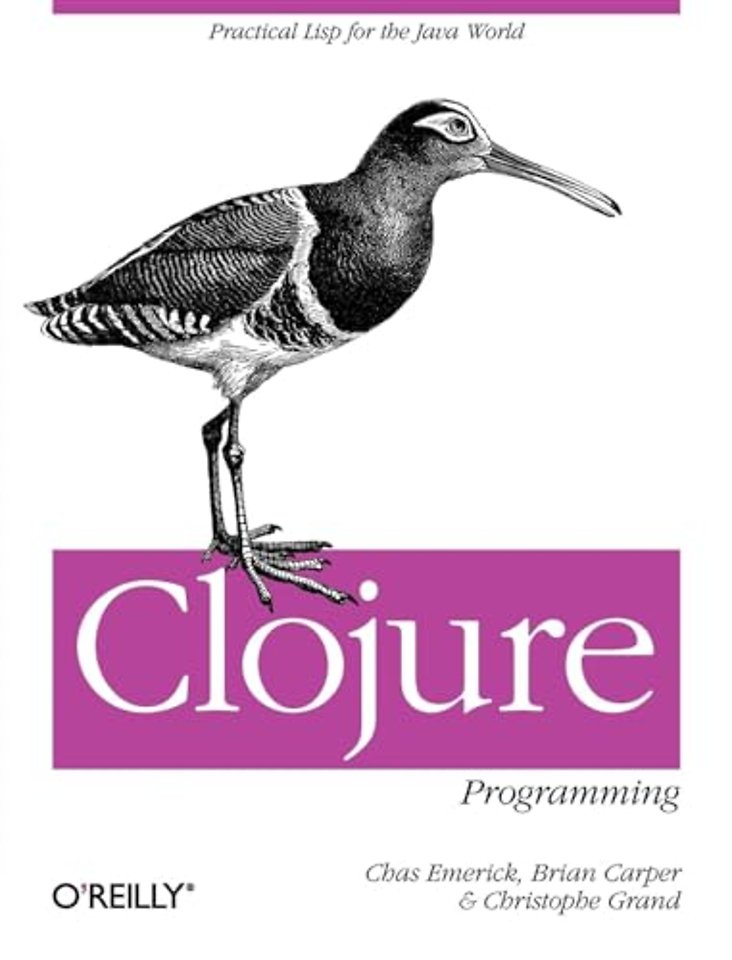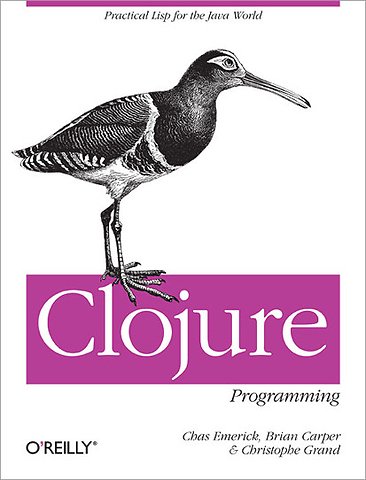


Chas Emerick is the founder of Snowtide Informatics, a small software company in Western Massachusetts where he is the technical lead for PDFTextStream, a PDF content extraction library for Java and .
Meer over de auteursClojure Programming
Practical Lisp for the Java World
Samenvatting
Why choose Clojure? This functional programming language not only lets you take advantage of Java Libraries, services, and other JVM resources, it rivals other dynamic languages such as Ruby and Python. With this comprehensive guide, you'll learn Clojure fundamentals with examples that relate it to languages you already know, in the domains and topic you work with daily.
Discover Clojure's flexibility in common tasks like web programming and working with the latest databases. You'll quickly learn how this language helps eliminate unnecessary complexity from your programming practice and opens up new options for solving challenging problems-including multithread programming.
- Use Clojure without losing your investment in the Java platform
- Understand the advantages of Clojure as an efficient Lisp for the JVM
- Learn how functional programming helps eliminate common bugs and faults
- Make concurrency and parallelism more tractable and reliable with battle-tested tools
- Eliminate the need for overley verbose and complicated design patterns
- Build abstraction with macros, data and protocols, and multimethods
- Deploy large web applications across hundreds of cloud nodes
Specificaties
Over Brian Carper
Over Christophe Grand
Inhoudsopgave
-Why Clojure?
-Obtaining Clojure
-The Clojure REPL
-No, Parentheses Actually Won't Make You Go Blind
-Expressions, Operators, Syntax, and Precedence
-Homoiconicity
-The Reader
-Namespaces
-Symbol Evaluation
-Special Forms
-Putting It All Together
-This Is Just the Beginning
Part 1: Functional Programming and Concurrency
2. Functional Programming
-What Does Functional Programming Mean?
-On the Importance of Values
-First-Class and Higher-Order Functions
-Composition of Function(ality)
-Pure Functions
-Functional Programming in the Real World
3. Collections and Data Structures
-Abstractions over Implementations
-Concise Collection Access
-Data Structure Types
-Immutability and Persistence
-Metadata
-Putting Clojure's Collections to Work
-In Summary
4. Concurrency and Parallelism
-Shifting Computation Through Time and Space
-Parallelism on the Cheap
-State and Identity
-Clojure Reference Types
-Classifying Concurrent Operations
-Atoms
-Notifications and Constraints
-Refs
-Vars
-Agents
-Using Java's Concurrency Primitives
-Final Thoughts
Part 2: Building Abstractions
5. Macros
-What Is a Macro?
-Writing Your First Macro
-Debugging Macros
-Syntax
-When to Use Macros
-Hygiene
-Common Macro Idioms and Patterns
-The Implicit Arguments: &env and &form
-In Detail: -> and ->>
-Final Thoughts
6. Datatypes and Protocols
-Protocols
-Extending to Existing Types
-Defining Your Own Types
-Implementing Protocols
-Protocol Introspection
-Protocol Dispatch Edge Cases
-Participating in Clojure's Collection Abstractions
-Final Thoughts
7. Multimethods
-Multimethods Basics
-Toward Hierarchies
-Hierarchies
-Making It Really Multiple!
-A Few More Things
-Final Thoughts
Part 3: Tools, Platform, and Projects
8. Organizing and Building Clojure Projects
-Project Geography
-Build
-Final Thoughts
9. Java and JVM Interoperability
-The JVM Is Clojure's Foundation
-Using Java Classes, Methods, and Fields
-Handy Interop Utilities
-Exceptions and Error Handling
-Type Hinting for Performance
-Arrays
-Defining Classes and Implementing Interfaces
-Using Clojure from Java
-Collaborating Partners
10. REPL-Oriented Programming
-Interactive Development
-Tooling
-Debugging, Monitoring, and Patching Production in the REPL
-Limitations to Redefining Constructs
-In Summary
Part 4: Practicums
11. Numerics and Mathematics
-Clojure Numerics
-Clojure Mathematics
-Equality and Equivalence
-Optimizing Numeric Performance
-Visualizing the Mandelbrot Set in Clojure
12 Design Patterns
-Dependency Injection
-Strategy Pattern
-Chain of Responsibility
-Aspect-Oriented Programming
-Final Thoughts
13. Testing
-Immutable Values and Pure Functions
-clojure.test
-Growing an HTML DSL
-Relying upon Assertions
14. Using Relational Databases
-clojure.java.jdbc
-Korma
-Hibernate
-Final Thoughts
15. Using Nonrelational Databases
-Getting Set Up with CouchDB and Clutch
-Basic CRUD Operations
-Views
-_changes: Abusing CouchDB as a Message Queue
-À la Carte Message Queues
-Final Thoughts
16. Clojure and the Web
-The "Clojure Stack"
-The Foundation: Ring
-Routing Requests with Compojure
-Templating
-Final Thoughts
17. Deploying Clojure Web Applications
-Java and Clojure Web Architecture
-Running Web Apps Locally
-Web Application Deployment
-Going Beyond Simple Web Application Deployment
Part 5: Miscellanea
18. Choosing Clojure Type Definition Forms Wisely
19. Introducing Clojure into Your Workplace
-Just the Facts..
-Emphasize Productivity
-Emphasize Community
-Be Prudent
20. What's Next?
-(dissoc Clojure 'JVM)
-4Clojure
-Overtone
-core.logic
-Pallet
-Avout
-Clojure on Heroku
Index
Anderen die dit boek kochten, kochten ook
Net verschenen
Rubrieken
- aanbestedingsrecht
- aansprakelijkheids- en verzekeringsrecht
- accountancy
- algemeen juridisch
- arbeidsrecht
- bank- en effectenrecht
- bestuursrecht
- bouwrecht
- burgerlijk recht en procesrecht
- europees-internationaal recht
- fiscaal recht
- gezondheidsrecht
- insolventierecht
- intellectuele eigendom en ict-recht
- management
- mens en maatschappij
- milieu- en omgevingsrecht
- notarieel recht
- ondernemingsrecht
- pensioenrecht
- personen- en familierecht
- sociale zekerheidsrecht
- staatsrecht
- strafrecht en criminologie
- vastgoed- en huurrecht
- vreemdelingenrecht





